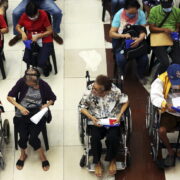SC: Child abuse case can be tried even without the victim’s court testimony

The Supreme Court affirmed the conviction of an accused of qualified rape against his minor daughter in a decision that reiterates the fact that child abuse cases can still go to trial even if the victims are unable to testify in court.
“The State is mandated to provide protection to those of tender years. By adopting the doctrine of unavailable child, the Court ensures that cases of child abuse or attempted child abuse can still be tried notwithstanding the unavailability of the child,” the high tribunal’s Second Division said in its decision on G.R. 258054 penned by Associate Justice Mario Lopez.
In the ruling promulgated on Oct. 25, 2023, and made public on Wednesday, the Supreme Court sentenced the accused to reclusion perpetua without eligibility for parole.
He is further ordered to pay the victim P150,000 each for civil indemnity, moral damages, and exemplary damages, with a 6 percent legal interest per annum from the finality of the decision until fully paid.
The victim, then 14 years old, told her aunt on May 25, 2018, that her father had been raping her since she was 10 years old.
Her aunt then took her to the barangay hall and the police station to file a complaint.
In her sworn statement, the victim narrated to the police the specific acts of abuse done to her by her father, with the most recent incident happening just the night before.
During the trial, the prosecution was unable to present the victim as a witness because her mother had sent her away to prevent her from testifying against her father.
In place of the victim’s direct testimony, the prosecution offered her sworn statement and the sexual abuse protocol form that she filled out when she first reported her father’s abuse to the police.
The prosecution also presented the medico-legal report and testimonies from the victim’s relatives.
Doctrine of unavailable child
Applying the doctrine of unavailable child under Section 28 of the Rule on Examination of a Child Witness, the Regional Trial Court (RTC)found the accused guilty of rape.
The accused appealed the ruling of the RTC to the Court of Appeals (CA), arguing that the victim’s statements should not have been accepted as evidence because she did not testify in court.
His conviction was affirmed by the appellate court, leading to his appeal, which was ultimately denied by the high tribunal.
The Supreme Court emphasized that requiring supporting evidence safeguards the accused’s right to due process.
Furthermore, the prosecution is responsible for proving the accused’s guilt beyond a reasonable doubt.
In this case, the high court ruled that the doctrine of unavailable child applied for two key reasons: (1) the victim could not attend the hearing as the prosecution failed to locate her; and (2) her hearsay testimony, including her sworn statement and the sexual abuse protocol, was corroborated by other evidence.
These enabled her out-of-court statements to be admissible.
The Supreme Court further ruled that the prosecution successfully proved the accused’s guilt beyond reasonable doubt based on the totality of the evidence presented.


















